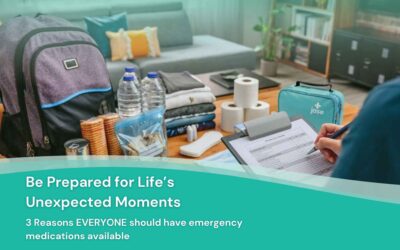When Disaster Strikes, It’s Not Hunger or Thirst That Takes the First Lives
In every disaster zone, from hurricanes in the Caribbean to war zones in Ukraine, the pattern is the same. People worry about food and water, but it’s infection that kills first. A small wound turns septic. A fever spirals into pneumonia. Chronic conditions like asthma or diabetes become lethal without access to medication.
Preparedness isn’t only about stockpiling calories and gear. It’s about protecting your body from the most common, and most preventable, causes of death when help can’t reach you.
The Hidden Killer: Infection
You can survive for weeks without food and several days without water. But a simple infection, left untreated, can take your life in less than 72 hours.
Disaster medicine specialists see this again and again. In a recent interview, Director of Jaseresponse.org & disaster & austere medicine expert, Aaron Asay, explained, “Getting an infection is going to kill me faster than anything, but it’s easily treated.”
The good news: antibiotics and wound care supplies can stop nearly all of these fatal infections if you have them on hand.
The bad news: most people don’t.
How Modern Convenience Has Made Us Vulnerable
We live in a system that assumes help will always be available. Pharmacies, supply chains, and hospitals operate seamlessly, until they don’t. When power grids, transportation routes, or communications fail, even short disruptions mean empty shelves and overwhelmed ERs.
In rural hospitals across North America, infections and sepsis are already a daily occurrence even when the system is working. In a crisis, those cases multiply, while access to care evaporates.
What Every Household Should Have
Start with the basics of infection prevention and chronic care support. A well-prepared home should include:
- Prescription antibiotics (legally obtained and physician-approved) to treat common bacterial infections. Jase was founded with the mission to help people be better prepared medically. Check out the JaseCase.
- Antiseptic solutions and wound dressings for cuts, punctures, and burns. With the help of Aaron Asay, Jase just launched a full line of First Aid kits to solve these life threatening problems.
- Anti-inflammatory and pain management medications.
- Emergency tools: EpiPen (for allergies), inhaler (for asthma), glucose control aids (for diabetics). (EpiPens and inhalers can be added to any JaseCase order)
- Oral rehydration and electrolyte packets to combat dehydration during illness.
These supplies aren’t luxury items, they’re lifesaving essentials.
Storing and Managing Your Medications
Preparedness is about foresight, not panic. Keep your medications organized, labeled, and rotated for freshness:
- Check expiration dates every six months.
- Store in a cool, dry place, heat and moisture degrade medicines.
- Keep backup doses for chronic conditions. Check out JaseDaily to get a backup supply today.
- Log your medications: what you have, when to reorder, and who they’re for.
Remember: expired medications may lose potency but rarely become toxic. Having something is better than nothing when supply chains fail.
The Jase Medical Solution
At Jase.com, we believe medical preparedness should be accessible to everyone, not just professionals or survivalists. That’s why we created the JaseCase, a physician-prescribed emergency antibiotic kit, and our JaseDaily service for long-term medication continuity.
In uncertain times, medical readiness is peace of mind. Because when the system breaks, your body can’t wait.
Prepare today, so you don’t have to panic tomorrow.
Learn more about JaseResponse.org, our non-profit humanitarian disaster response program aiming to bridge the gap between crisis and medical care. Donate today!
© 2025 Jase Medical. For educational use only. Always consult a licensed medical provider before using or changing medications.
Lifesaving Solutions
Everyone should be empowered to care for themselves and their loved ones during the unexpected. Check out our recent lifesaving products today.
Recent Posts
Keeping you informed and safe.
Exploring Dr. William Makis’ Hybrid Orthomolecular Cancer Protocol: Focus on Ivermectin and Mebendazole/Fenbendazole
Exploring Dr. William Makis’ Hybrid Orthomolecular Cancer Protocol: Focus on Ivermectin and Mebendazole/Fenbendazole *Disclaimer: This article is for educational purposes and does not constitute medical advice. Always seek professional guidance.* In the evolving...
Be Prepared for Life’s Unexpected Moments
3 Reasons EVERYONE should have emergency medications avaiable. It's all about access—access to medications and care when you need it most. And when things happen outside of your control that access can disappear.Below are 3 examples of how easily this access can be...
Youth Preparedness: Teaching, Building, and Coping with Disasters
Educating and preparing your children ahead of time means fewer surprises in the event of an emergency.Growing Up Prepared: Empowering Youth in Disaster Preparedness As we observe National Preparedness Month, it's crucial to remember that disasters can strike at any...
Low-Cost and No-Cost Emergency Preparedness Measures
Small steps today, mean a safer tomorrow for you and your loved ones.Low-Cost and No-Cost Emergency Preparedness So far in our series for National Preparedness Month this September, we've already covered How to Make an Emergency Plan for Your Household and How to...





